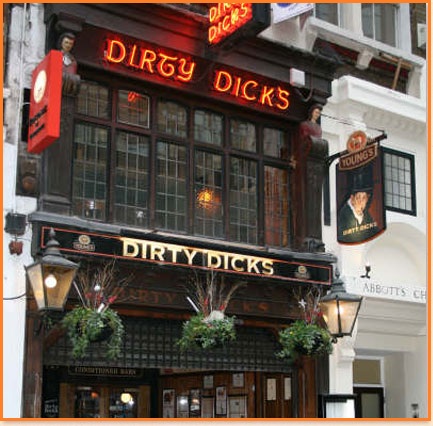Pub culture in England:
British Daily Life: Living in England Dinner Gift Ideas Wedding Gifts Favorite Pasttimes Favorite Pets British People Holidays Greeting Manners How Is Conkers Game Played? How is Family Life In Britain? How is Typical Teenager Life? Popular British Sayings & Idioms Popular Games Kids Play Subjects to Talk During a Meal Table Manners in the UK Terms of Endearment Types of Shops In Britain Typical Birthday Celebrations Typical Day and Weekend for a Child in Britain What Is a Pub? England Taboos Year-round special days, events and holidays in Britain January Special Days & Events February Holidays March Holidays April Events
Pub culture in England
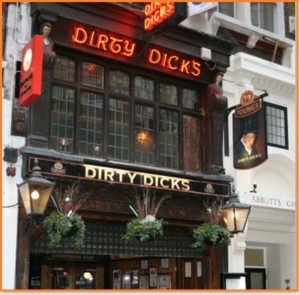
Here, I’ll try to answer these common queries
Why do the British spend so much time in the pub?
It’s a common misconception to think that the British spend a lot of time in the pub. It’s true that the pub culture is deeply ingrained in our psyche, but when some pubs have been around for over 800 years and the ‘alehouse’ or ‘tabernacle’ has been around since Roman times, it’s easy to see why.
What is a pub?
The pub is the shortened version of ‘Public House’ – a house that the public has a right to enter as opposed to a private house – someone’s home.
Pubs and taverns have long established roots in offering accommodation as well as hospitality, and whilst the number of pubs offering rooms has since dropped there are many that still do.
In rural areas, the local church and the pub(s) are the main focal points of the community where people meet to chat, drink, eat and play games like darts, snooker, and skittles.
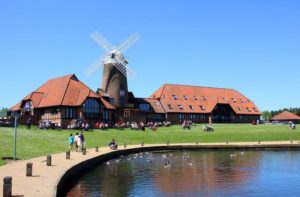
Many modern pubs also show sport on big screens, such as football (soccer) and rugby as many people enjoy the camaraderie of watching games with friends.
Some people may visit their local pub on an almost daily basis, whilst others may only visit a pub once a week or month. Sometimes people will visit a pub in the country on a Sunday for Sunday lunch as its relaxing atmosphere can make an enjoyable change to many people’s busy lives.
What are the topics of conversation in a pub?
When meeting up in a pub, conversations tend to revolve around sport, politics, family, and work, but generally, it’s quite light-hearted as many pub atmospheres are not conducive to deep conversations.
What are typical Pub signs
Ye Olde Trip to Jerusalem, whose cellars are carved from the rocks beneath Nottingham Castle, is just such an example. Established in 1189, it claims the title of the oldest pub in England and was a stopover point for forces on their way to meet with Richard the Lionheart.
Other signs on this theme are the Turk’s Head, Saracen’s Head and Lamb & Flag – the lamb representing Christ and the flag the sign of the crusaders.
Even after the Dissolution of the Monasteries in the 16th Century, some of the names denoting religious connections survived, such as the Mitre, the Ship (symbolizing the Ark) and the Anchor (the Christian faith). However, many of the landlords thought it more politic to show allegiance to the monarch and hastily adopted titles like the King’s Head or the Crown. Henry VIII who ordered the Dissolution is, unsurprisingly, the most popularly depicted monarch.
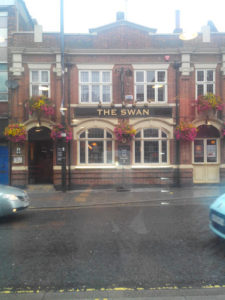
Heraldry has been a recurrent theme, the Black, White, Red and Golden Lions have formed part of the royal coat of arms since the time of the Norman Conquest. The Unicorn was in the Scottish arms, the Red Dragon in the Welsh and the White Horse in the Hanoverian. The Rising Sun was the badge of Edward III. Local gentry often had pubs on their land named after them or parts of their cognizance were taken.
Anyone who caught the public imagination was likely to be immortalized such as Lord Nelson or Wellington and even loveable rogues like Dick Turpin get a mention.
Marquis of Granby
One of the most affectionate tributes is reserved for the Marquis of Granby, Commander in Chief of the British army. After the Battle of Warburg, he bought pubs for all his non-commissioned officers. His generosity ruined him however and he died in 1770 leaving crushing debts of £37,000.
Sporty names
In the days of a largely illiterate population, pictorial signs were an essential way of advertising the inn or the type of entertainment on offer inside. Any pub called the Cock Inn or the Cock Pit would once have been a venue for cockfighting. Ye Old Fighting Cocks in St Albans (which also claims to be the oldest pub in Britain) was originally the dovecote for St Albans Abbey. After the Dissolution, it was realized that its circular shape made it a perfect venue for cockfighting. Just to confuse things, any pub called the Cock & Bottle has nothing to do with sport. It simply denotes that both bottled and draught beers were available.
As to other entertainments, the Bear denotes bear baiting, the Dog & Duck hunting, the Bull & Dog bull baiting and the Bird in Hand, falconry. Nowadays, the more modern sports are represented by names like the Cricketers’ Arms, the Anglers’ Rest or the Huntsman.
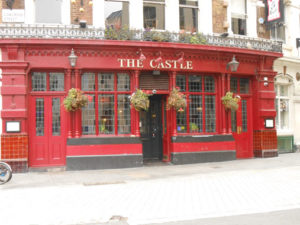
Often the predominant trade of the area would give the pub its name. The Golden Fleece is a reflection of the local wool trade. The Coopers’, Bricklayers’, Saddlers’ and Masons’ Arms are commonplace signs. Legend has it that the Smiths Arms in Dorset was once a blacksmith’s forge where Charles II stopped to have his horse shod. Whilst he was waiting he demanded a beer but was told the blacksmith was unlicensed. Exercising his royal prerogative, he granted one and was duly served.
In the 18th Century, the population became more mobile and a need for coaching inns grew with predictable names such as Coach and Horses or Horse and Groom. Later the advent of steam gave every town its Railway Inn or Station Arms.
Counties in England – Information on all English counties with places to see and things to do in those counties. Tourist attractions in major towns, wedding venues, places for afternoon tea and caravans.
More Info On- What is a pub and what do people do there, Dirty Dicks Pub in London, Milton Keynes: Caldecotte Arms Pub

